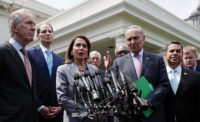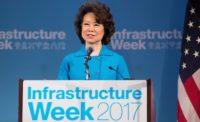In an outpouring of comments and reactions to President Joe Biden's $2-trillion-plus American Jobs Plan, formally unveiled on March 31, leaders of construction, engineering, energy, business, organized-labor and construction-materials groups generally agree with the proposal's emphasis on the need for significant infrastructure investment.
But some oppose Biden's call to pay for the huge plan by increasing the corporate tax rate to 28% from the 21% rate enacted in 2017 under the Trump administration.
READ MORE: President Outlines $2-Trillion-Plus Jobs Package Centered on Infrastructure
Doug Carlson, National Utility Contractors Association CEO, said the Biden plan “has some very good elements in it," singling out the $111 billion for water infrastructure and $100 billion for broadband.
But he expressed concern about the proposed boost in corporate taxes, saying that NUCA and other business groups are "wary about how the President is going to pay for all of this with corporate tax increases on the very companies that create new jobs.”
Worries About Corporate Tax Proposal
Kip Eideberg, senior vice president of government and industry relations at the Association of Equipment Manufacturers, is concerned that a higher taxes would negatively affect the global competitiveness of heavy-equipment makers.
Linda Bauer Darr, American Council of Engineering Companies' president and CEO, hailed the Biden plan's "vision and scope," noting its recommended $621 billion for transportation. But Darr said that "ACEC is concerned that taxing America's businesses, including small firms, could offset and undermine the economic recovery the President's plan is trying to achieve."
TAKE OUR POLL: Do You Approve or Disapprove of Biden’s Infrastructure Plan and Funding Strategy?
Darr was one of several industry leaders who proposed a different "pay-for." she said, noting that "for decades, infrastructure investments have been financed by the users of the system who enjoy the benefits of improved roads, bridges and rail systems and we urge lawmakers and the administration to put this option back on the table for consideration."
That's an apparent reference to the tax on gasoline and diesel fuel, the main revenue source for the Highway Trust Fund, which helps finance road and transit projects.
Alternative Pay-For: User Fees
Kevin Dempsey, American Iron and Steel Institute president and CEO, also favored a model based on a “dedicated user fee,” citing AISI’s support of strengthening trust fund motor-fuel taxes and other excise taxes.
Neil Bradley, executive vice president and chief policy officer at the U.S. Chamber of Commerce, hinted at a similar user-fee model. He said, “A major investment in infrastructure today is an investment in the future, and like a new home, should be paid for over time—say 30 years—by the users who benefit from the investment." The U.S. Chamber has long been on record as supporting a fuel-tax hike.
The trust fund has been in financial trouble for years, as income from fuel taxes has fallen short of highway and transit construction needs. To erase the shortfall temporarily, Congress has shifted billions of dollars to the trust fund from the general fund.
Michael Johnson, National Stone, Sand & Gravel Association president and CEO, said, "Our entire surface transportation system is overutilized and underfunded." He added, "NSSGA will continue to fight to make sure that any infrastructure package rightly prioritizes surface transportation and provides significant long-term investment in the Highway Trust Fund."
Labor, Water, Energy
Some groups zeroed in on other particular elements in the Biden proposal. Associated Builders and Contractors President and CEO Michael Bellaman took issue with the plan's provisions to use project labor agreements on federally funded projects. He said the proposal's preference for union labor would exclude the vast majority of construction workers.
On the other hand, North America’s Building Trades Unions President Sean McGarvey supported administration backing for collective-bargaining efforts. He also said proposed funding levels would “further enable NABTU to train women, communities of color, veterans and the formerly incarcerated for construction careers through pre-apprenticeship and registered apprenticeship training programs.”
Nathan Gardner-Andrews, National Association of Clean Water Agencies general counsel and chief advocacy officer, said the plan will “aid clean water agencies across the country invest in critical infrastructure projects, advanced technologies, and greater water quality protection.”
Dempsey of AISI praised the plan’s “strong domestic procurement preferences for federally funded infrastructure projects."
Leading energy groups also weighed in.
“We’re staring in the face of a once in a generation opportunity for jobs and energy transformation,” said Heather Zichal, American Clean Power Association CEO. “This infrastructure plan is a steroid shot to rebuild our economy and get serious about climate change, and they’re intertwined.”
The focus on union jobs would allow workers in fossil-fuel sectors to transition to clean energy jobs, said Abigail Ross Hopper, Solar Energy Industries Association's president and CEO. “These union jobs, along with numerous other career-sustaining jobs in solar, offer another moment to prioritize equity and create opportunities in every community, regardless of zip code, including for fossil fuel workers who are looking to continue their careers in the energy sector.”
Frank Macchiarola, American Petroleum Institute senior vice president for policy, economic and regulatory affairs, praised incentives for hydrogen and carbon capture, utilization and storage (CCUS) technology development. But he said the Biden plan missed an opportunity “to take an across-the-board approach to addressing all our infrastructure needs–including on modern pipelines.”
Portland Cement Association President and CEO Mike Ireland welcomed the proposed investment and incentives for CCUS development. He also said that his group supports the priority Biden placed on "resilient infrastructure and recognition of sustainable building materials.”
Jim Tymon, American Association of State Highway and Transportation Officials' executive director, hailed the Biden proposal as "a first step in a conversation about a generational investment in transportation infrastructure...."
He called on Congress and the administration to pass a long-term highway-transit bill by Sept. 30, when the present authorization measure lapses. it's unclear whether Congress will address that surface transportation legislation as part of an omnibus infrastructure measure, or separately.
Commenting on the Biden plan's unveiling, Dave Bauer, American Road & Transportation Builders president and CEO, took a broader view.
“The most important thing is not whose plan passes Congress, but that at the end of the process the American people have increased mobility and the competitiveness of the U.S. economy is strengthened,” he said.





Post a comment to this article
Report Abusive Comment